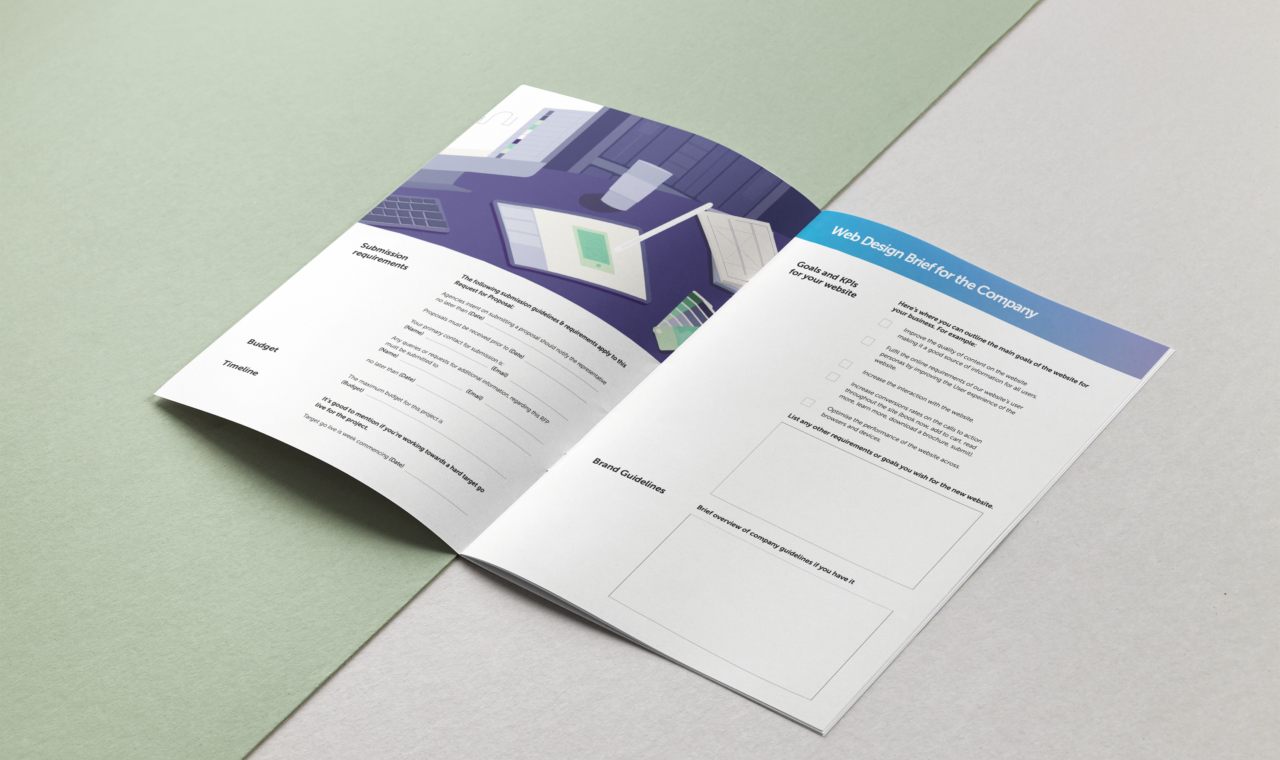How to write an effective website brief
When embarking on the development of a new website, it is vital to provide a clear website brief to your shortlist of agencies you wish to tender for the project. A well-written brief ensures that everyone involved understands the objectives, target audience, and KPIs of the new website. It also helps to be sure that each agency understands what to quote for giving them an even playing field and you the confidence that they are quoting like for like.
In this article, we will outline the key elements that we feel you should include in your website brief, enabling you to effectively communicate to the web design and development team.
Introduce your business & customers
Firstly, introduce your business to the team. Include essential details such as your company’s core business and the industry you operate in. Provide an overview of your products or services, key differentiators against competitors (also list who the key competitors are), and any unique selling points that should be considered as part of the design and development of the website. Provide a solid background to your business as the more your agency understands your business, the better equipped they are to promote your business online.
Your budget scale (controversial I know)
Try to give a ballpark maximum of the budget allocated for the website project. This will help to give the agency an idea of what they have to work with. There is no point in asking for a website that has all the bells and whistles that is worth 12k when you only have 4k to spend. An agency will either quickly tell you what can be achieved for your budget and where best to spend it or possibly other solutions that would be best suited. Each agency will submit a tender so they will always aim to be as competitive as possible.
How long will this all take?
Try to define the timeline for the website development project. Taking into account your workload and that of any other stakeholders who might need to get involved. Include the expected start date and the desired completion date but be realistic with your expectations, considering factors like content creation, who is going to write or collect the content? Factor in rounds of feedback on the UX and UI designs. The development phase which is often a set number of weeks and if it’s a big or technically challenging website can go into months. Ask the agency to include a sample timeline for the project as part of the tender process. This will give you an idea of the number of weeks/months they would expect the project will take.
What are your goals for the website?
Clearly articulate the main goals you want to achieve with the new website.
For example:
- Better alignment with Brand Identity
- The current website looks outdated
- The website needs to work better on mobile devices
- Enhanced Functionality like integration with a CRM or other marketing tools
- Conversion Rate Optimisation on sales and leads
- A new or enhanced e-commerce solution
- General improved user experience leading to better conversion rates
Define the goals to ensure that the selected agency understands the goals to achieve the desired UX flow or UI design and functionality. Compile a list of websites that you and other stakeholders find aspirational and engaging, even if they are outside your industry. Look for inspiration in navigation, user engagement, specific functionality, design and branding, as these elements can set you apart from competitors.
Guardians of your brand
If you have a set of brand guidelines for your company then state that they must be adhered to to ensure consistency across your brand including the website. The brand guidelines should include information on your brand’s visual identity, logo usage, color schemes, typography and imagery moodboard. Specify any particular design elements or style choices that should be incorporated into the website. Your selected agency must be one of your brand guardians. If you require an update to your branding along with your website then state that as a part of the brief but bear in mind that not all agencies have the capability in house (we do of course).
Define your target audience
Your target audience (user personas) will assist in defining the user journeys throughout the website. Consider how these users engage with you when they visit your business, email or call. What kind of information are they looking for and how can your website assist in fulfilling their requirements? Include demographics, interests, and any other relevant information such as buyer behavior and any goals and frustrations that they may have when visiting your website. Understanding your target audience will enable the agency team to create a user-focused website and help you to tailor the content to engage with your users.
The website features and functionality
Consider the key features and functionalities you require for the website. This can include anything from contact touch points such as forms, email sign up, request a call back, chat bots, booking forms, calendars as well as e-commerce capabilities, blogs and news, social media integration. This all helps to ensure the agency can provide you with the most accurate price proposal for your project.
Preferred content management system (CMS)
Should you have a preference for a particular CMS, make sure to mention it. Or you can ask for advice from the agency as to what they would suggest. Opting for a popular CMS ensures that you won’t face difficulties in finding professionals who can update and maintain your website going forward should you move to another agency down the line.
Do you need SEO and analytics?
The question really should be why would you not need SEO and analytics? It is essential to include a full SEO migration conducted by an SEO specialist as a minimum requirement for your website go live strategy. This process guarantees that your website maintains its search engine rankings when the new website is launched, thus preventing any potential drop in visibility.
As part of the project, it is important to ensure that Google Analytics code is added to the new website. If you haven’t set up analytics on your current site, this is an opportunity to implement it. Alternatively, if you already have a Google Analytics code in place on your current site, it should be transferred and integrated into the new website. This ensures you don’t lose valuable data and tracking with the change over to the new website.
Maintenance and support after go live
Will you need continuous maintenance and support for the website after its launch? The more likely answer is yes. Ask the agency to clarify the level of support they give, such as regular website software updates, bug fixes, and security patches as well as video call and email support. Your website is essentially software running on a computer so ongoing maintenance is essential to ensure a smooth running website, just like your office or home computer.
Mention if you have an in-house team to handle content updates or if you would like the web development team to provide a quote for those services. This could be simple text and image amends or even layout changes or enhancements. A website should change and grow over time with the goals of your business and needs of your customers.
Training your team
If you or your team will be responsible for managing the website’s content, it is important to request training on the chosen CMS. This will ensure that you acquire the necessary skills to effectively update and manage your website’s content.
Additionally, inquire whether the agency will provide a manual or a video guide as part of the training. Having these resources can serve as valuable references for future use, allowing you to access instructions and guidance whenever needed.
Our final thoughts
Ask agencies for their recommendations and insights based on their expertise. Engage in discussions about their approach to research, user experience, design and development. This will give you a better understanding of their methodology and allow you to evaluate their expertise and alignment with your project goals.
Bear in mind that creating a website that best serves you and your customers will require time from you and your team to inform and educate the agency about your business and customers. Without that input the agency will be working with one hand tied behind their backs. This is a 2 way process and the final product will reflect that.
And finally, while it is understandable that price plays a significant role in decision-making, it is essential to remember that the cheapest option may not always be the best choice. Remember that this is a business investment and you don’t want to cut corners only to find you need to overhaul or start afresh in a year.
When evaluating proposals or selecting a web development agency, focus on finding a balance between affordability and expertise. Consider the agency’s track record, portfolio, client testimonials, and the overall value they bring to the table. Investing in a reliable and experienced team might entail a higher initial cost, but it can provide long-term benefits and a higher return on investment.
About OPEN Design and Digital
We’re a Dublin design studio, experts in web design, online marketing and branding. Our mission: boost your business with captivating websites, meaningful content, and innovative design. Need a fresh website or a brand makeover? Let’s talk!
You can also email us at info@weareopen.ie or call on 01 685 3550.
Talk to us
Whatever your sector or project, we’d love to hear about it. Why not give us a call, or drop us an email.
Follow us
Find us
Guinness Enterprise Centre
Taylors’s Lane
Dublin 8





